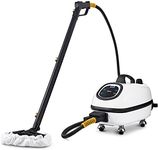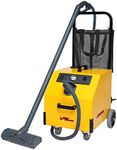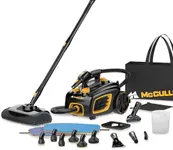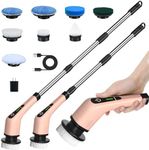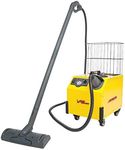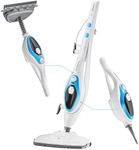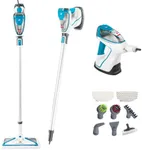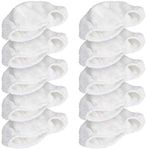Buying Guide for the Best Grout Cleaning Machines
Choosing the right grout cleaning machine can make a big difference in how easily and effectively you can clean the grout lines in your tiles. The right machine will save you time, reduce physical effort, and help you achieve better results compared to manual scrubbing. When shopping for a grout cleaning machine, it's important to understand the key features and specifications that affect performance, ease of use, and suitability for your specific cleaning needs.Type of Cleaning MechanismThe cleaning mechanism refers to how the machine actually cleans the grout. Common types include steam cleaners, rotary brush machines, and oscillating scrubbers. Steam cleaners use hot steam to loosen dirt and kill germs, making them great for deep cleaning and sanitizing. Rotary brush machines use spinning brushes to scrub away grime, which is effective for tough stains but may require more effort to maneuver. Oscillating scrubbers use a back-and-forth motion to clean, offering a balance between power and control. To choose the right type, consider the level of dirt you typically deal with and whether you prefer chemical-free cleaning (steam) or more mechanical scrubbing power (rotary or oscillating).
Brush or Pad SizeThe size of the brush or pad determines how much area you can clean at once and how easily you can reach into narrow grout lines. Smaller brushes or pads are better for tight spaces and detailed work, while larger ones cover more area quickly but may miss narrow lines. If you have small tiles or intricate grout patterns, a smaller brush is ideal. For larger, open areas, a bigger brush or pad will help you finish faster.
Power SourceGrout cleaning machines can be powered by electricity (corded), batteries (cordless), or manual effort. Corded machines provide consistent power and are good for long cleaning sessions, but you need to be near an outlet. Cordless machines offer more freedom of movement but may have limited battery life. Manual machines rely on your own effort and are best for small jobs or occasional use. Think about the size of the area you need to clean and whether you value mobility or unlimited run time.
Water and Solution Tank CapacityIf the machine uses water or cleaning solution, the tank size affects how long you can clean before needing to refill. Larger tanks mean fewer interruptions but can make the machine heavier and harder to maneuver. Smaller tanks are lighter but require more frequent refills. For big cleaning jobs, a larger tank is convenient, while for quick touch-ups or small spaces, a smaller tank is easier to handle.
Weight and ErgonomicsThe weight and design of the machine impact how comfortable it is to use, especially for longer cleaning sessions. Lighter machines are easier to carry and move around, while heavier ones may offer more scrubbing power but can be tiring to use. Ergonomic handles and adjustable features can also make a big difference in comfort. If you have limited strength or need to clean for extended periods, look for a lightweight, well-designed machine.
Noise LevelSome grout cleaning machines can be quite loud, which may be a concern if you are sensitive to noise or need to clean in a shared or quiet environment. Quieter machines are more pleasant to use, especially for longer periods. If noise is a concern for you, check the manufacturer's information or user reviews for comments on how loud the machine is during operation.
Ease of MaintenanceAfter cleaning, you'll need to maintain your machine by emptying tanks, cleaning brushes, and possibly replacing parts. Machines that are easy to take apart and clean will save you time and hassle. If you prefer low-maintenance equipment, look for models with simple designs and easily accessible parts.

